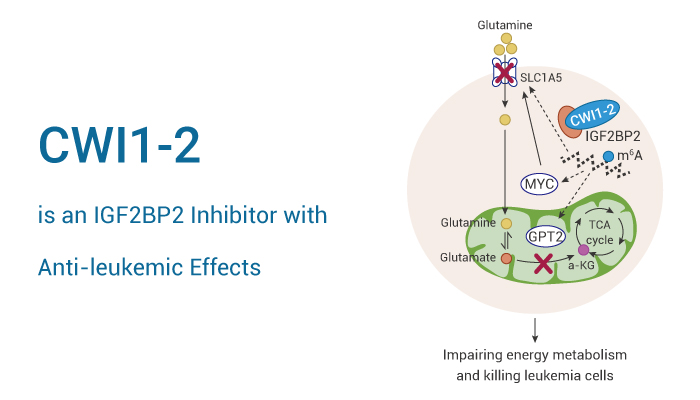IGF2BP2, also known as IMP2, is a member of the insulin-like growth factor 2 messenger RNA-binding protein (IGF2BP) family that is highly conserved in vertebrates. Besides, it was first identified as an RNA-binding protein that binds IGF2 messenger RNA (mRNA). Then it was subsequently shown to bind many other RNA transcripts as well as N6-methyladenosine-modified long noncoding RNAs. IGF2BP2 has played roles in a wide range of biological and disease processes, including embryonic development, neurogenesis, metabolism, insulin resistance, and cancer progression.
CWI1-2 is an IGF2BP2 inhibitor with anti-leukemic effects.

CWI1-2 is an IGF2BP2 inhibitor that binds IGF2BP2 and inhibits its interaction with m6A-modified target transcripts, induces apoptosis and differentiation, and shows promising anti-leukemic effects. It (0-1 μM, 24 h) has good anti-leukemic efficacy. Firstly, it can induce significant cell differentiation and apoptosis in a concentration-dependent manner in IGF2BP2-high cells but not in IGF2BP2-low cells. Secondly, it reduces Gln uptake and impairs mitochondrial function, resulting in reduced ATP production in AML cells. Moreover, it significantly inhibits the colony-forming ability of MA9-induced leukemic mouse blasts and greatly impairs the self-renewal of LSC/LIC. In addition, CWI1-2 (5 mg/kg, i.v., once daily, 7-10 days) can significantly delay the onset and survival time of leukemia in BMT receptor B6.SJL (CD45.1) mice without significant effect on body weight.
In conclusion, CWI1-2 is an IGF2BP2 inhibitor that induces apoptosis and differentiation and shows promising anti-leukemic effects.
References:
[1] Arash Latifkar, et al. Proc Natl Acad Sci U S A. 2022 Nov 8;119(45):e2200477119.
[2] Hengyou Weng, et al. Cancer Cell. 2022 Dec 12;40(12):1566-1582.e10.